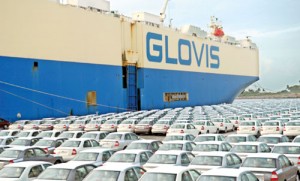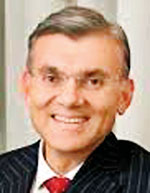Fresh blood, new thinking among ruling classes a must if country is to take off

File pic of the Hambantota port
An infusion of fresh blood, both in politics and business, is needed if Sri Lanka is to avoid the doomsday scenario of slipping back into the sad and bad days of ‘Big Man’ illiberal democracy (read the Rajapaksa era), leading economist Prof. Razeen Sally declared.
The Sri Lankan-born associate professor at the Lee Kwan Yew University in Singapore believes the island might ‘miss the bus’ again, simply due to lack of political will amongst the ruling class who are content to let events drift without coming good on their promise of Yahapalanaya (good governance).
“It is not in the interests of the present incumbents to change things. For the country to take-off we need people with vision and dynamism and inspired to move forward in a different way. We need an injection of fresh blood in the political elite as well as business elite but even though the government has changed, the political class is still the same,” Prof. Sally said at a forum organised by Advocata Institute, a free-market think tank, in Colombo this week.
He outlined three scenarios facing the country at the moment. The first being ‘Drift’ (the country is in this situation now) where although things are much better than two years ago (but not by much), instead of good governance ‘we have’ mediocre governance and with the economy being saddled with poor macroeconomic, fiscal and monetary policies.
Two scenarios
His other two scenarios were an optimistic ‘Take-off’ – complete with a stable liberal democracy, broadly shared economic growth, ethnic reconciliation and balanced foreign relationships – and lastly the doomsday scenario or ‘Relapse’ which smacks of a Rajapaksa-like personality with echoes of a Premadasa, J. R. Jayewardena or even Mr. and Mrs. (SWRD) Bandaranaike holding the reins of power.

Prof. Razeen Sally
“Ethnic relations are the most worrying feature of this scenario. This ‘big man’ is invariably going to be a Buddhist chauvinist riding at the head of a Sinhala-Buddhist movement. It began with Anagarika Dharmapala, and it has reared its head many times since independence. It last reared its ugly head under the Rajapaksas,” Prof. Sally pointed out.
“The charismatic ‘big man’ comes along taking advantage of social discontent, wins the presidential elections and comes into a clean house which means neutering opponents. It means a state-run economy. It means selectively allowing foreigners in (investments) provided they cut the right deals with the powers-that-be.”
This bleak picture could well happen if people in power don’t get their act together warned the erudite professor who said the window of opportunity was closing fast.
“Time is running out. Sri Lanka has a year at best to put things in order. It is a pity that short-term political expediency has taken priority over everything else at the moment. We are in scenario one right now – Drift – very far away from scenario two which is Take-off but dangerously close to scenario three (Relapse).”
Counting the blessings brought about by the coalition government, Prof. Sally said at least the people has lost their fears, the media was freer, a 19th amendment to the constitution had been put in place, the restoration of public independent commissions and a new constitution was in the works.
“The ethnic temperature is lower than it was a couple of years ago and yes the right symbolic overtures have been made to the minorities. The other good news is that foreign relations have been re-balanced. What was a very China-weighted foreign policy has been changed and now we have good relations with China and restored relations with India and the West.”
No Yahapalanaya
“The bad news is that there is no Yahapalanaya. On the ethnic front, the fundamental issues have still not been dealt with. Land restitution, redress for human rights abuses, de-militarisation and not least of course the genuine devolution of power. But the politics of all that is daunting for any government which has to look behind its shoulder to the Sinhala-Buddhist heartland and that is understandable.
“But what I think has really gone wrong is the economy and that is crucial for without getting that right or better everything else falls apart,” he added.
He blamed the economic mess on poor policies – from fiscal to monetary to macroeconomic – and the habitual role of governments since independence for spending too much and creating mountains of public debt exacerbated by inflation, current account deficits and a declining rupee.
“The situation has stabilised a little now. The last budget, at least to-date, was not as disastrous as the previous two budgets. If things go according to plan – and that is a big IF depending on the implementation in Sri Lanka – then Sri Lanka might get closer to having revenue closer to 15 per cent of GDP as opposed to 10-11 per cent of GDP.”
“Its good news but it is limited because the budget is not about serious tax reform. It is about doing the minimum to satisfy IMF requirements and preventing a full-blown crisis. Monetary policy was also bad until a few months ago with the Central Bank being far too politicised over a 10-year period.”
Indrajith’s entry, only good news
“The one bit of good news and the only good senior appointment this government has made was that of Dr. Indrajit Coomaraswamy (governor of the Central Bank). He is the right man for the job, with excellent credentials. He is clean, competent and also got very good temperament. (In the) Last few months he has done his best to restore integrity and credibility to the Central Bank.”
Prof. Sally called for total reforms in trade and business policies highlighting the fact that the country’s trade to GDP ratio was low (50 per cent) while it was between 150 and 200 per cent in other East Asian countries with similar populations like Malaysia and Taiwan.
“One reason why these reforms are necessary is that Sri Lanka needs much more competition, whether it comes from new players who are locals or foreign players. It is really striking what little competition there is in the economy wherever one looks.”
“Most markets are tied up by little monopolies or oligopolies and the commanding heights are dominated by the Dhammika Pereras and Harry Jayewardenes of this world with their political connections, who are sitting on very comfortable rents and the last thing they want is competition and there is collusion between these commanding heights and political class.”
“Sri Lanka needs creative destruction, whether it comes from foreigners or locals but they are blocked at every turn. This is bad for efficiency and production and it screws consumers. All of this boils down to one fact, there is still no economic plan for reforming the economy.”
So are the four Horsemen of the Apocalypse around the corner? Yes, if Prof. Sally’s belief that the political class needs to be overthrown.
“What is striking is that even though the government has changed, the political class hasn’t,” he reiterated. “Musical chairs have been played within the political class. The incumbents don’t want the younger generation to break through because that threatens their interests and threatens the interests of their business cronies. This comes around to the conclusion that nothing fundamental is going to change unless we see a breakthrough of a younger generation within politics and business.”


